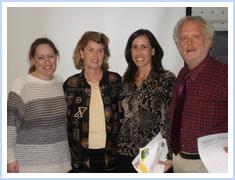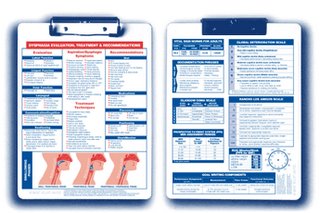A very special thanks to Dr. Pietranton, Executive Director of ASHA, for taking time out of her very busy schedule to speak to NSSLHA at CSULA!
 Tonight, Dr. Pietranton gave a special inside perspective on ASHA's internal network, in addition to how we as (future) members of ASHA can benefit from all the resources that are available to us. As Dr. Pietranton best described, "[ASHA] is our professional association; it belongs to us who are members. It advocates for us, engages in public relations and regulations for us...It is the organization through which we, as members, decide what are the best practices for our profession."
Tonight, Dr. Pietranton gave a special inside perspective on ASHA's internal network, in addition to how we as (future) members of ASHA can benefit from all the resources that are available to us. As Dr. Pietranton best described, "[ASHA] is our professional association; it belongs to us who are members. It advocates for us, engages in public relations and regulations for us...It is the organization through which we, as members, decide what are the best practices for our profession."
.·:*¨¨*:·. .·:*¨¨*:·..·:*¨¨*:·. .·:*¨¨*:·. .·:*¨¨*:·. .·:*¨¨*:·. .·:*¨¨*:·.
What is ASHA?
"A national professional, scientific, and credentialing organization."
Although many know that ASHA is the nation’s largest speech, language, and hearing association and that we should all “be” members, there is more to this organization than meets the eye. This association sets the standards and paves the way for our profession…and our future. It decides what knowledge and skills we should have to be considered a qualified and competent professional.
ASHA Facts and Resources
- ASHA currently represents 123,190 speech-language pathologists, audiologists, and speech, language, and hearing scientists. As of December 31, 2005, there are 102,724 SLPs and 12,798 audiologists.
- There is a shortage of males in both speech-language pathology and audiology. "ASHA's goal is to mirror the crowd that we deliver services to," commented Dr. Pietranton, "but we have a long way to go." According to ASHA, “Males currently comprise 4.4% of speech-language pathologists, 18.6% of audiologists, and 28.4% of those with dual certification. Overall, the proportion of male ASHA constituents has declined steadily."
Important Resources
- American Speech-Language-Hearing Foundation (ASHF). Go to ASHF's website for ongoing scholarships and grants. Are you interested in pursuing a doctoral degree or need new investigator grants for research? ASHF may be able to aid you!
- As a paying member, you can go to ASHA's website for online archives of their scholarly, peer-reviewed journals that date back to 1990. (This has come in VERY handy throughout many of our undergraduate, post-baccalaureate, and graduate studies.)
- As Ms. Lisa Aniversario mentioned in our February meeting, the Minority Student Leadership Program (MSLP) is a "leadership development program established for racial/ethnic undergraduate senior and graduate students who are enrolled in communication sciences and disorders programs." Applications are available in March.
- ASHA gathering place: Join ASHA's mentor/mentee program. You can be paired up with a professional who will give us insight through our academic studies and help us launch our careers!
- Get involved! "Get involved on a local, state, or national level. If you are interested in shaping the future of our profession, volunteering is a great way to benefit, learn from, and shape our field.” Dr. Pietranton suggests that to familiarize yourself with the committees and boards. "Let someone know that you are interested; fill out a Pool Form and submit it!" (Pool Forms are available online at www.asha.org)
Questions & Answer
Q1: On the critical issues listed in your Powerpoint, you note that caseloads in schools are huge. What is ASHA doing? (Note: Dr. Pietranton's Powerpoint presentation is available on the sidebar menu, under "Local Forms")
A1: “ASHA is doing a number of things. We are putting into place the opportunity for more involved partnership between ASHA, as a national association, and targeted state associations because some of the regulations are decided at the state and federal level. In the last eight years, we have been trying to influence at the federal level, so we commit to work with targeted states to try to influence the public policy and educational regulations...We are working on promoting a "workload model," which focuses on workload rather than caseload. It's not about the numbers, it’s about what the kids need, how many meetings we go to, how much paperwork we have. It’s more of a refined way of looking at what is the amount of time and effort that is associated with the workload versus the caseload. Some work with the targeted states have adopted that model so they’ve moved away from the cap of 80 to 100 students. It is important that people in decision-making roles in related fields understand the value of this model so that they can advocate for this."
Q2: Regarding the doctoral shortage, I noticed the majority of the programs are on the East Coast. Is anything being done to bring more doctoral programs closer to us?
A2: Currently, the state universities are not allowed by state law to offer doctoral programs. Many UCs [University of California] do not want to get together with [state universities] for a joint program. There are now no audiologists being trained from within state. Within California, this is predominantly a federal issue. The actual standards are set by CAA [Council on Academic Accreditation in Audiology and Speech-Language Pathology], all who are members of ASHA and examine this issue.
Q3: Can ASHA be more involved at a state level? Perhaps work with CSHA [California Speech-Language-Hearing Association]? Could ASHA encourage CAA to look at standards differently? Can public policy be different?
A3: I am not aware of any commitment in a targeted look other than an awareness that there are some unusual circumstances.
Q4: What, besides academic knowledge, should we take away from our education?
A4: One of the most important things is to take away the framework for life-long learning. The evolution of the profession and the opportunities as professionals is very exciting. It creates a range of possibilities that will be with us for our whole career.
Whether we identify with one setting or re-tool and move across settings, is the notion of life-long learning. The other piece of advice is being evidence-based so that our profession has integrity and credibility.
Overview of ASHA's programs
"These are the core aspects of the services and activities that [ASHA] engages in."
- Academic Affairs works closely with instructors, student affairs, counselors, researchers to identify issues, forecast needs and trends, recommend policies, and work to ensure that the needs of academic programs are addressed
- Accreditation looks at the important qualifications a graduate program should have to ensure that the graduate students become certified in this field.
- Action center is the "“triage center" that takes general questions and requests. If you have questions or concerns, you can contact them via E-mail at actioncenter@asha.org or Professionals/Students can call 1-800-498-2071, 301-897-5700 TTY; general public can call 1-800-638-8255. Available 8:30 a.m. - 5:00 p.m. ET
- Audiology Practices "provide consultation on audiology policy and practice to members, federal agencies, media, and other external publics; assist in association policy development; track and recommend Association action to respond to relevant national trends; recommend and plan audiology service and programs and educational product development."”
- Certification sets the standards and requirements for who can practice.
- Communications oversee all the scholarly journals/publications (i.e., ASHA Journal, ASHA Leader). All ASHA publications dated back to 1990 are available online to members.
- Ethics ensures the public that they are receiving safe and competent service from professionals, by regulating what is an appropriate code of conduct.
- Government Relations and Public Policy decides on issues such as how services get reimbursed and where ASHA should invest money. Recently, ASHA is funding awareness in two arenas. 1) Evidence-Based Practice. Professionals need to use research data to drive clinical decision making. 2) Doctoral Shortage. There is a shortage of individuals who have or are pursuing Doctoral Degrees. ASHA is working on this to assure that this field will continue to be a scientific-based field.
- Membership: Join now! ;)
- Product Development and Sales are the liaisons between various vendors such as textbook vendors.
- Office of Multicultural Affairs (OMA) "addresses cultural and linguistic diversity issues related to professionals and persons with communication disorders and differences."
- Professional Education "review and recommend policies and procedures to the Executive Board for the planning, coordination and evaluation of all Association sponsored continuing education activities and products [and] develop and maintain an integrated plan for all continuing education activities and products" so that professionals can continue to develop necessary skills.
- Science and Research actively track data sources such as incidence figures, work force trends, etc. Note: if you are doing a research paper and need any information regarding data sources, you can call the national office and they will help identify some data sources for you!
- 16 Special Interest Divisions that members can belong to, identify with, or learn more from, in a particular area of practice. Professionals can network and focus on an area of expertise on a smaller scale.
.·:*¨¨*:·. .·:*¨¨*:·..·:*¨¨*:·. .·:*¨¨*:·. .·:*¨¨*:·. .·:*¨¨*:·. .·:*¨¨*:·.
In closing, Dr. Pietranton commented, "Do what you want to do and do it well. Find things that you really are passionate about, things that really matter to you because you will do it well and with energy and passion, and your excellence will be noted and other opportunities will follow. Be open to those other opportunities as well"
Fellow colleagues ~ keep learning, get involved, pursue a doctoral degree, and practice evidence-based practice! Most importantly, be passionate about it all!
 Clipboards for sale! But these aren't just any clipboards...these are specially made for SLPs!
Clipboards for sale! But these aren't just any clipboards...these are specially made for SLPs!
